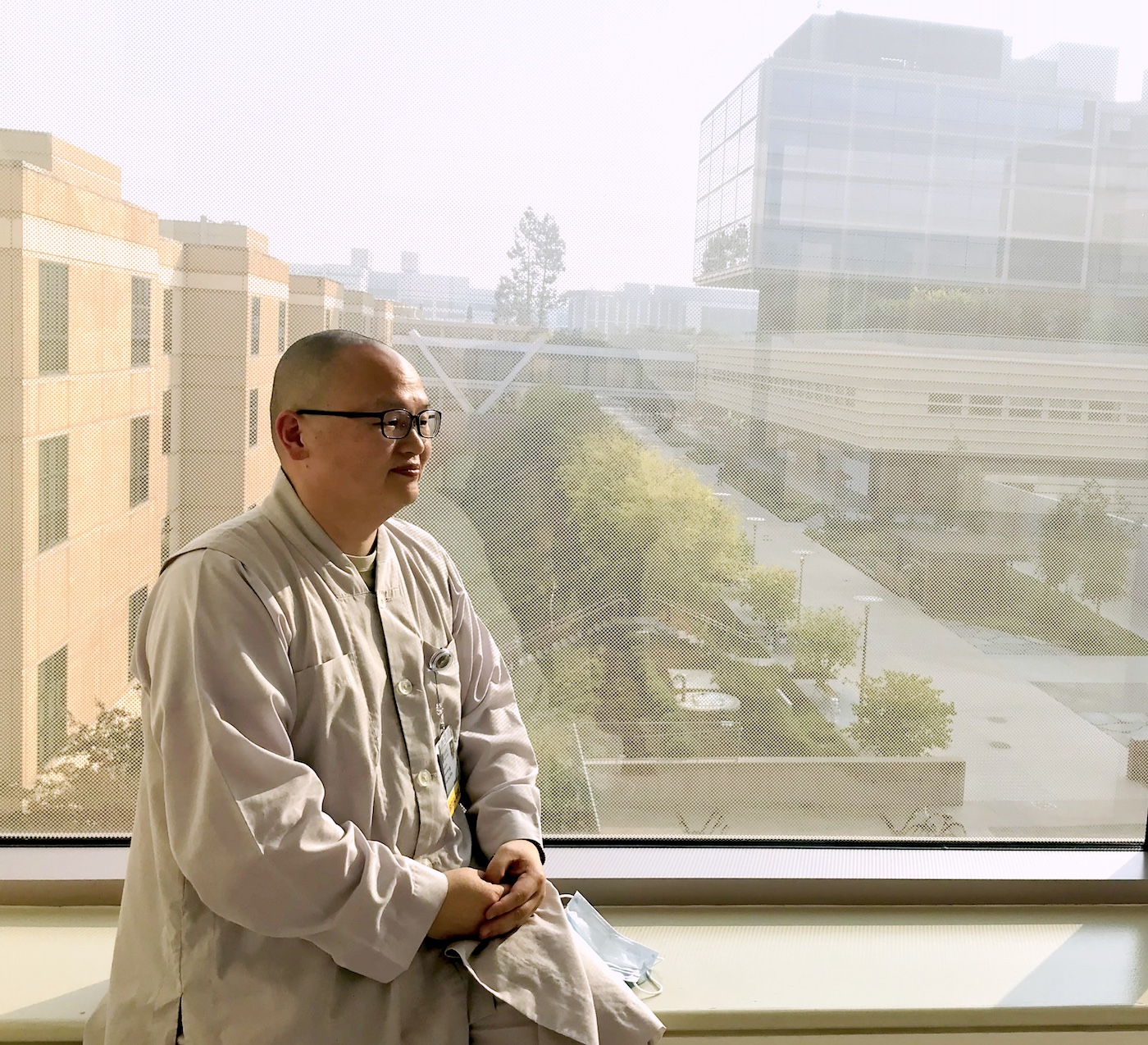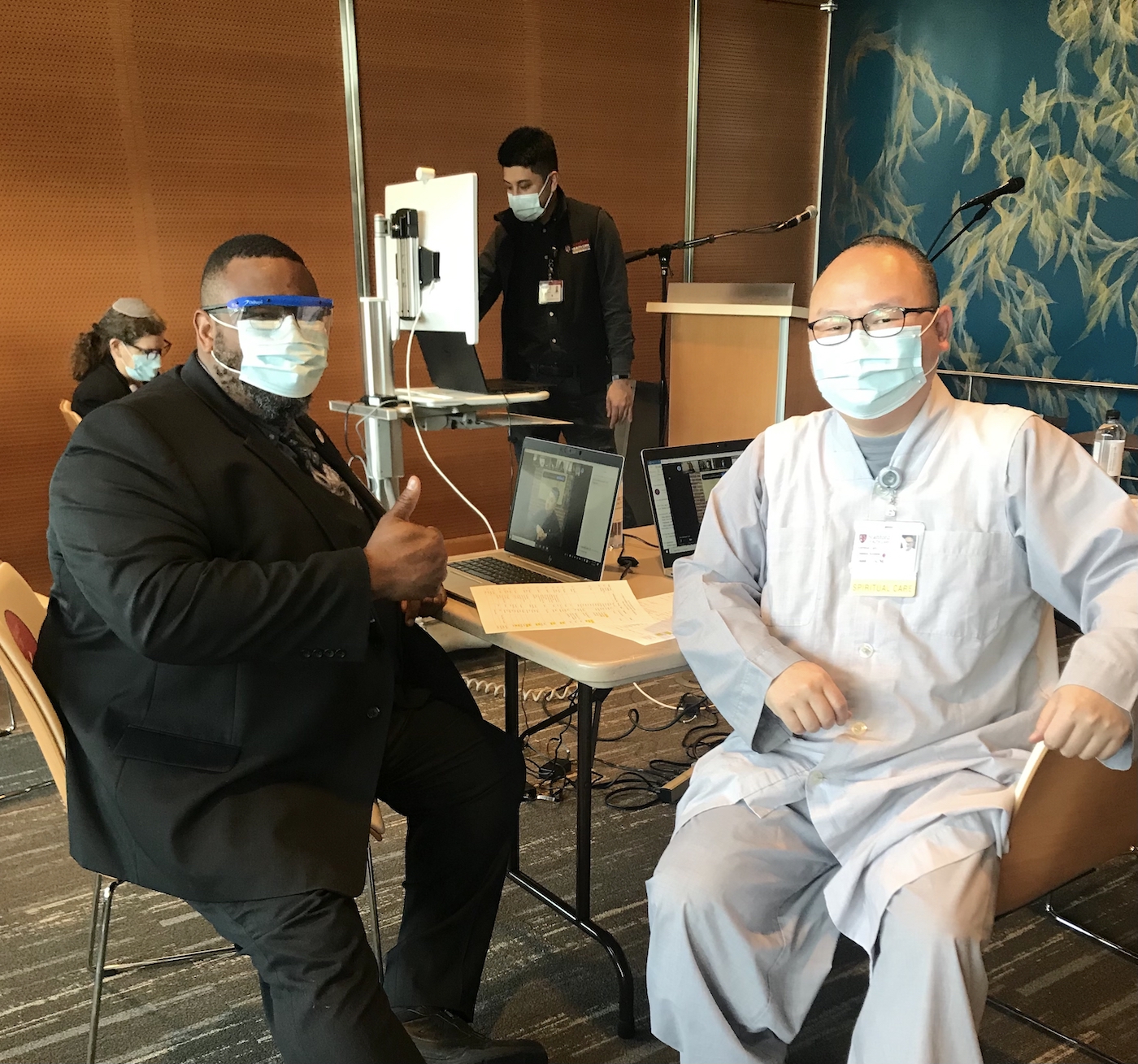FEATURES|COLUMNS|Exploring Chinese Buddhism
Serving Humanity in Transition: Chinese Buddhism and Spiritual Care in the United States
Four years ago, I had an opportunity to interview the revered Chan Buddhist monastic Venerable Guan Zhen while he was pursing his master’s degree in Social Work at Columbia University in New York City.* As a Buddhist monk who was ordained in China in 2001, Ven. Guan Zhen has gained a uniquely diverse experience as a spiritual caregiver after arriving in the US. Like other board-certified chaplains of different faiths, he completed four units (1,600 hours) of Clinical Pastoral Education. Over 10 years of practice in the field, Ven. Guan Zhen has served a variety of organizations, ranging from the United States Military Academy at West Point to the Department for the Aging of the Mayor’s Office in New York City. Most recently, Ven. Guan Zhen worked at a medical center in Northern California after the outbreak of the COVID-19 pandemic.
I recently followed up with Ven. Guan Zhen for Buddhistdoor Global’s Special Issue 2021: Humanity in Transition, to learn about his ongoing work and to invite him to share his insights into how Chinese Buddhism may benefit humanity in this time of change.
Ven. Guan Zhen at a medical center in Northern California.
Image courtesy of Ven. Guan Zhen
Buddhistdoor Global: Ven. Guan Zhen, it’s nice to talk to you again after you’ve had time to acquire more experience as a spiritual caregiver in the US. How has your “journey to the West” been so far?
Ven. Guan Zhen: Ms. Zhang, thank you so much for having me! It's great to cross paths with you again after four years. Indeed, what a “journey to the West” for me as a Buddhist monastic from China! So far, the journey has been rich, colorful, and meaningful, adding so many valuable experiences to my life.
BDG: In your post as a spiritual caregiver in clinical settings, what were your responsibilities?
VGZ: My main responsibility as a clinical spiritual caregiver this past year was to provide religious, spiritual, and emotional support to patients, family members, and medical teams, and to bring peace and comfort, serving humanity through my own Chinese Chan Buddhist practice as appropriate in this unprecedented time.
BDG: What kind of patients did you care for? In terms of religious background, I guess they were not all Buddhists, as Buddhists only constitute around 1 per cent of the American adult population?** Was that challenging?
VGZ: I took care of patients in the general medicine unit, intensive care unit, and oncology unit. I also participated in palliative care and decedent care. During on-call time, I responded to the needs of all patients in the hospital. Indeed, many of my patients were not Buddhists, but Buddhism teaches me not to discriminate. Instead, we should meet others with compassion. I have found myself saying prayers that are not Buddhist, but these prayers provide comfort to the sick. I think I’ve grown more flexible.
The outbreak of COVID-19 in early 2020 has particularly changed human society and the way we live and communicate. The world has become more chaotic, fearful, confusing, and uncertain. I have witnessed much more suffering this year than before, and I need to grow in my practice in order to be better able to serve my patients.
Ven. Guan Zhen and colleague Chaplain Paul Andrew.
Image courtesy of Chaplain Paul Andrew
BDG: Has spiritual care been much in demand during the pandemic? Would you please tell us more about your experiences working on the frontline?
VGZ: Since the pandemic began, there has been a greater need for spiritual care in the hospital. Between November 2020 and February 2021, while we witnessed a tremendous number of deaths, family visits were not allowed. It was emotionally difficult for patients, family members, medical teams, as well as chaplains. I remember that I had to spend long stretches of time on the floor caring for patients who were alone. I made phone calls to their family members so they could stay connected. I also checked in with nurses and medical staff who were sometimes struggling too. Facing so many deaths in such a short time really took a toll, emotionally and spiritually. Often family members would call on chaplains to visit their loved ones or to pray with them. Humbly being present, being available, and providing them with emotional and spiritual support, this is where I have seen myself as a Chinese Buddhist monastic providing spiritual care in clinical settings during the pandemic.
BDG: The origin of the pandemic is still being disputed, however, according to the Buddhist teachings, a disaster is caused by what humans do collectively—what we term as “collective karma (共业).” Could you please elaborate on that? And does Buddhism offer solutions for us to move forward together?
VGZ: We have seen much hatred and ignorance arise during this difficult time. What I would like to observe here is that we must be responsible for whatever actions we take. If we look at how human activities have led to climate change, we clearly see that collective action or inaction (or karma) has caused probably the biggest humanitarian crisis in history. In fact, some renowned scientists today have also predicted that climate change will lead to many more deadly diseases yet unknown to us. Regarding your other question, I think the teaching of the Four Immeasurables—loving-kindness (慈), compassion (悲), vicarious joy (喜), and equanimity (舍)—from Chinese Buddhism need to be practiced urgently. Loving-kindness brings happiness (慈能予乐) and compassion relieves suffering (悲能拔苦). As for vicarious joy and equanimity, feeling happy for others and utilizing skillful generosity can lead to a new way of living in the world. That is how we can distribute the vaccines widely. When we recognize that we are all interconnected, we can move from a humanitarian crisis to safety and from uncertainty to certainty.
 Calligraphy by Ven. Guan Zhen, which reads: “Loving-kindness, Compassion, Vicarious Joy, and Equanimity, the Four Immeasurables” (慈悲喜捨四無量). Image courtesy of Ven. Guan Zhen
Calligraphy by Ven. Guan Zhen, which reads: “Loving-kindness, Compassion, Vicarious Joy, and Equanimity, the Four Immeasurables” (慈悲喜捨四無量). Image courtesy of Ven. Guan ZhenBDG: Death is a topic that we tend to avoid. However, the pandemic has made death feel closer to us, as it has taken away the lives of people we know and love. According to Buddhism, how death should be understood?
VGZ: I think we should understand that death is inevitable for everyone. It is only a matter of when and how. Over this last year, I have witnessed many patients dying alone. The hospital where I work started with two COVID-19 units in September 2020 and quickly increased the number to four a month later. The mortality rate of COVID-19 patients during that period was very high. The hospital has 600 beds. I remember the highest death rate was in January 2021, when it exceeded 30 per cent. In one month, 183 patients died at the hospital. Since the hospital could not allow visitors at that time, patients died alone. As a spiritual caregiver in this special situation, I was called to visit dying patients. I had to talk, counsel, and pray with them through Zoom, right outside their door. Reflecting on this experience, I sometimes wonder about the future of humanity. I don’t have an answer for this. Nevertheless, I have hope that, through the development of loving-kindness and compassion as a collective karma, instead of hatred and ignorance, death can be faced with courage and care, even in the most challenging of times.
BDG: Thank you, Ven. Guan Zhen. One last question: you mentioned that even the healthcare staff would need spiritual support as they tirelessly helped and treated their patients. Indeed, during the pandemic, self-compassion and self-care has also come into focus. Would you please share your own views?
VGZ: As you mentioned before, we face collective karma that is not easily changed by individuals. However, individual change is the only way that leads to collective change—internal first and then external. My understanding is that self-compassion and self-care are important, and that neither should be considered selfish. To me, selfishness is the action/karma of lacking compassion and wisdom. On the other hand, self-compassion and self-care allow an individual to recognize their own capacity and to maintain good and appropriate boundaries—only then can one better serve others. During this uncertain time, for instance, with this ongoing pandemic and climate change, I think self-compassion and self-care are the foundation for healing, hope, and humanity.
* Life in America as a Chinese Buddhist Monastic: An Interview with Venerable Guan Zhen (Buddhistdoor Global)
** 5 facts about Buddhists around the world (Pew Research Center)
Related features from Buddhistdoor Global
Buddhist Spiritual Care
A Buddhist Chaplain for the Tibetan Community in Toronto
Toward a Multi-faith Vision of University Chaplaincy in America: An Interview with Reverend Greg McGonigle
Buddhist Ministry Initiative Conference: Building Partnerships and Forging Ties
More from Exploring Chinese Buddhism by Guoying Stacy Zhang
Buddhistdoor Global Special Issue 2021: Humanity in Transition
















